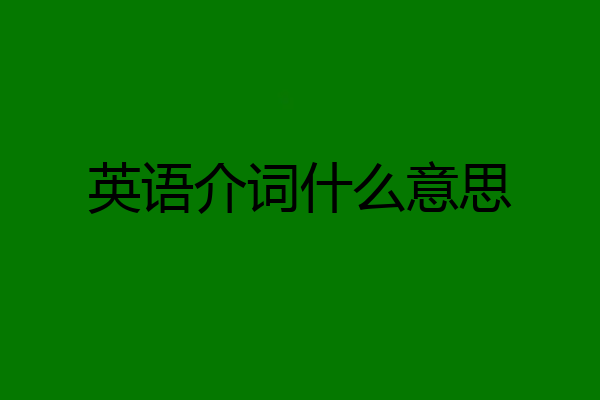
小希很爱小希
介词是英语中最活跃的词类之一。一些常用介词搭配能力特别强,与其他词组合,能表示种种不同的意思,大部分习惯用语都是由介词和其他词构成的。 介词不能单独做句子成分,必须与名词、代词或动词的-ing形式等构成短语,才能在句子中充当一个成分。 介词主要有: 1. 表示地点位置的介词(above, at, behind, below, beside, between, in, in front of, inside, next to, on, opposite, outside, over, under) 2. 表示时间的介词(in , on, at; in, after; from, since; after) 3. 表运动方向的介词(across, along, down, from, into, off, onto, out of, over, round, through, to, up) 4. 表示其他意义的介词(on ,about 关于; by, with, in 表示方法、手段、工具; except, besides


彩色珊瑚
介词(preposition)是一种表示名词、代词等与句中其他词的关系,在句中不能单独作句子成分。介词后面一般有名词代词或相当于名词的其他词类,短语或从句作它的宾语。介词和它的宾语构成介词词组,在句中作状语,表语,补语或介词宾语。介词可以分为时间介词、地点介词、方式介词、原因介词、数量介词和其他介词。

Candy00321
英语中介词是:
介词(是prepositions,简称prep),又称前置词,是英语中最活跃的词类之一,连接主语和表语.特别是一些常用介词的搭配力特别强,可以用来表示各种不同的意思.英语里大部分习语都是由介词和其他词构成的.介词在句中一般不重读.
在定语从句“介词+who/which”的结构中,不能用that 代替who/which.She is a good student from who we should learn.in , on,at 在……时 in表示较长时间,如世纪、朝代、时代、年、季节、月及一般(非特指)的早、中、晚等.
如 in the 20th century, in the 1950s, in 1989, in summer, in January, in the morning, in one’s life , in one’s thirties等. on表示具体某一天及其早、中、晚. 如on May 1st, on Monday, on New Year’s Day, on a cold night in January, on a fine morning, on Sunday afternoon等.
at表示某一时刻或较短暂的时间,或泛指圣诞节,复活节等. 如at 3:20, at this time of year, at the beginning of, at the end of …, at the age of …, at Christmas, at night, at noon, at this moment等. 注意:在last, next, this, that, some, every 等词之前一律不用介词.